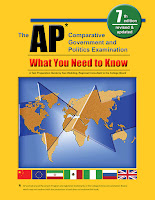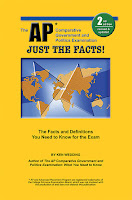United Kingdom (not language)
Generally, one of the key characteristics of a nation is a common language. So, how has the United Kingdom done so well for so long?
See the video for the whole discussion.
‘Please repeat the question’: In Britain’s Parliament, two English speakers struggle to communicate
Teaching Comparative blog entries are indexed. Use the search box to look for country names or concept labels attached to each entry.
What You Need to Know 7th edition is ready to help.
Order the book HERE
Amazon's customers gave this book a 4-star rating.
See the video for the whole discussion.
‘Please repeat the question’: In Britain’s Parliament, two English speakers struggle to communicate
Britain’s Parliament was divided by a common language on Thursday, as one politician was forced to repeat a question twice when his colleague couldn’t understand him, before eventually submitting the question in writing after his attempts at verbal communication failed.
Both politicians, of course, were speaking English.
The incident took place during a meeting about House of Commons Commissions, a body that oversees the administration of Parliament and its grounds, as David Linden of the Scottish National Party asked Conservative member of Parliament Paul Beresford about planned renovation works.
“I know from speaking to a number of parliamentary colleagues that there are still certain aspects of the estate, including the northern estate, that are not great for disabilities,” Linden said, referring to the facilities used by Parliament.
“Can I ask the honorable gentleman what work is being done to make sure this place is more accessible, particularly for some of our colleagues who have a disability?” he asked.
The remark sparked nervous laughter from other politicians in Parliament.
“Oh well,” said Linden. “I’m very popular today.”
He tried again: “I’m saying that a number of parliamentary colleagues who have disabilities do find it quite difficult getting around certain parts of the estate. Given that we’re doing this refurbishment work, what can be done to make sure that those with disabilities are able to move around more freely and that the place is accessible?”
But the confusion remained. “I’m really sorry,” Beresford said. “Please could you do it very slowly and in antipodean English?”
The two politicians represent constituencies in Britain that are roughly 350 miles apart — only a little further apart than Los Angeles and San Francisco and closer together than D.C. and Boston. But Beresford, who represents Mole Valley in Surrey, England, could not understand the accent of Linden, who represents Glasgow East in Scotland.
Despite being a relatively small country, Britain has a vast array of different regional accents. The Glaswegian accent is particularly distinctive, known for features such as the “glottal stop” (where a “t” sound gets dropped) and often considered hard to understand by those from other parts of Britain: In 2010, to the amusement of the Scottish press, a London-based firm even hired a Glaswegian interpreter...
Teaching Comparative blog entries are indexed. Use the search box to look for country names or concept labels attached to each entry.
What You Need to Know 7th edition is ready to help.
Order the book HERE
Amazon's customers gave this book a 4-star rating.




Comments
Post a Comment